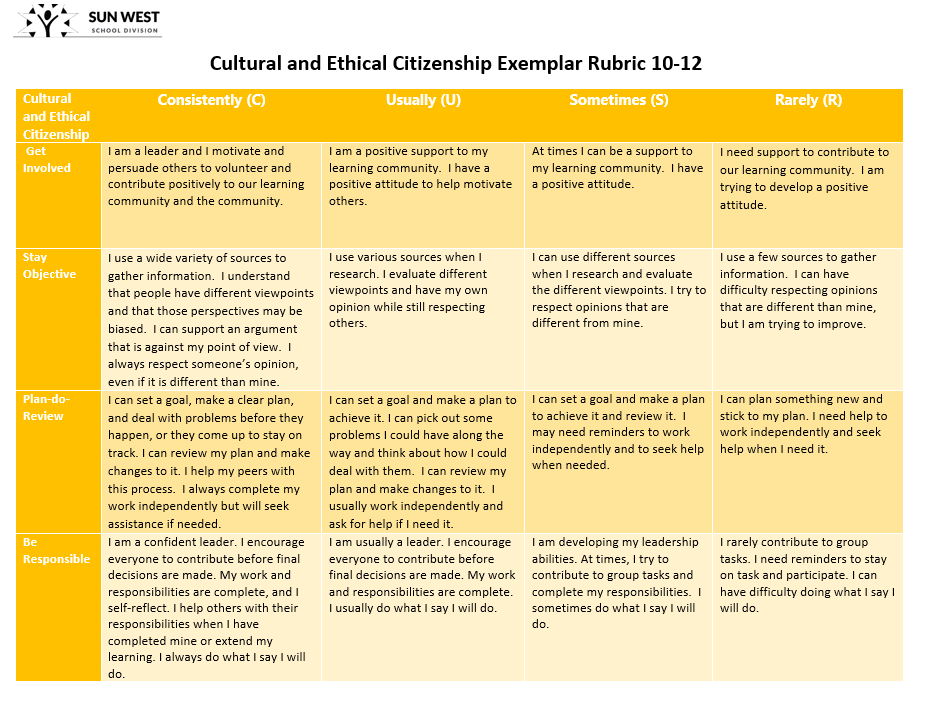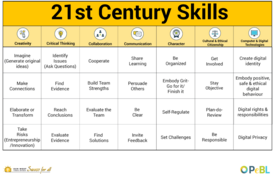Cultural and Ethical Citizenship Guidebook - 10-12 (High School) Sun West
Cultural and Ethical Citizenship High School 10-12
Purpose
Why is this important?
Cultural and Ethical Citizenship is a key 21st Century skill that students need to embody in order to create and share their views and opinions, as well as expand their understanding of their role within a group as a leader and contributor. Having the skills and abilities to get involved, stay objective, plan-do-review, and be responsible, allows students to be successful participants in the planning of their learning and assessment.
Key Steps in Teaching Cultural
and Ethical Citizenship Strategies
1. Isolate the skill needed to be taught.
2. Provide students with direct teaching to learn strategies and practice self-awareness.
3. Provide and allow opportunities for students to practice the skills and strategies, and reflect often. This takes time at first, but students are rewarded for their efforts once they are able to master their practiced skill.
4. Revisit strategies and skills often.
Explicit Teaching
To be able to learn and grow in 21st Century Competency understanding, it is important to teach each skill and let students experience what each skill looks like as well as how you can grow in each area. Caution: by simply saying the word "communication or collaboration...etc" students may not get a full understanding of each skill. Explicitly teaching and utilizing skills in different ways is what will ultimately promote deep understanding and growth in 21st Century Competencies.
Timeline Suggestions for Explicit Teaching
The document below provides a year plan to teach each of the 21st century skills. It is beneficial to have an explicit teaching plan to ensure each skill is taught; however skills should also be reinforced as much as possible throughout class time.
Lesson Plan Ideas
Get Involved
Stay Objective
Plan-Do-Review
Be Responsible
Integration of Skills
Intentional integration of 21st Century Competency language in all day-to-day activities supports the development of routine reflection, skill use, and growth in support of curricular knowledge acquisition.
Why?
If we do not intentionally integrate 21st Century Competency connections into our learning environments, it is easy to forget about them. As the language becomes routine, growth in skills can and should be explored regularly. Ultimately the 21st Century Competencies are the skills needed to be successful in all day-to-day activities as well as future career opportunities. By being intentional in integrating the language and skill use in all aspects of learning, understanding of the skills can be applied and reflected upon to look for areas of potential growth and application.
How?
Once skills have been explicitly taught, integration of 21st Century Competencies can be achieved by connecting skills to all curricular areas, participating in pre-and post reflections (allowing students to predict which skills will be needed and subsequently which skills need to be worked on) and the use of 21st Century Competency rubrics to track growth. Example: by using learner profile data, students can reflect on which skills they need to employ for a particular activity and based on this information, choose group members that have strengths or challenges in those skill areas.
Examples
When integrating 21 Century Competency language in all areas of learning consider the following curricular connected resources. As you use similar resources in your own learning environment, how can you relate them back to growth and understanding of the 21 Century Competencies?
In ELA
In Math
Teachable moments
Whenever a question, situation, comment or activity that involves a connection to a 21 Century Competency arises, take a moment to talk to students about it. Discussing skills, how they integrate into everything you do in life makes the reflection on the importance of skills a habit. This habit will instill a growth mindset around developing skills to their fullest potential. Teachable moments can be as short as 20 seconds. Make it your habit and it will become theirs!
Tracking Growth
When considering 21st Century Competency application, it is essential for both the teacher and the student to track growth. There is clear potential for growth in skill use throughout our lives. To ensure growth and understanding of application is taking place, we can easily track progression using rubrics, checklists, and self-assessments.
Formative Assessment
Formative assessments of 21st Century Competencies include anecdotal documentation, self-assessments and rubric check-ins. These formative assessments provide snapshots of growth throughout the learning process and allow goal setting to take place.
See below for Self-Reflection and Goal Setting Documents:
Assessing Growth
Summative Assessment
Exemplar Rubrics:

Cultural & Ethical Citizenship 10-12
Cultural and Ethical Citizenship Exemplar Rubric 10-12
|
Cultural and Ethical Citizenship |
1 |
2 |
3 |
4 |
5 |
|
Get Involved |
I can sometimes volunteer during discussions or volunteer to help with projects and jobs around the classroom and community. |
I can usually volunteer during discussions and offer to help. I also listen closely to my learning community and respect them. |
I can be a support to my learning community, I try to have a positive attitude all of the time. |
I can be a support to my learning community, I try to have a positive attitude to help motivate others. |
I can be a leader, I am able to motivate and persuade others to volunteer and help. |
|
Stay Objective |
I can use other people’s ideas as well as my own to solve a problem. |
I can investigate two different viewpoints when answering a question and think about each equally. |
I can use various sources when I research and evaluate the different viewpoints. |
I can use various sources when I research and evaluate the different viewpoints and have my own opinion while still respecting others. |
I can understand that people have different viewpoints and that those perspectives may be biased. I can try to create an argument that is against my point of view. |
|
Plan-do-Review |
I can plan something new and stick to my plan |
I can set a goal and make a plan to achieve it with help. |
I can set a goal and make a plan to achieve it and review it. |
I can set a goal, and make a plan to achieve it. I can pick out some problems I could have along the way and think about how I could deal with them. I can review my plan and make changes to it. |
I can set a goal, make a clear plan, and deal with problems before they happen and as they come up to stay on track. I can review my plan and make changes to it. I help my classmates with this process. |
|
Be Responsible |
I do not contribute in group meetings. I need constant reminders to stay on task and participate in group activities. |
I can communicate and speak up when I have ideas. I contribute little in group tasks. I try keeping up with the group but have difficulty doing so. |
I am a leader who has good ideas. I contribute in group tasks and complete my responsibilities on time. I do not waste time and work is well done. |
I am a confident leader. I encourage everyone to contribute before final decisions are made. My work and responsibilities are well done. |
I am a strong leader. I encourage everyone to contribute before final decisions are made. My work and responsibilities are well done. I help others with their responsibilities when I have completed mine or extend the learning. |
Co-creating Rubrics
Exemplar rubrics have been developed for K-5, 6-9 and 10-12. To connect fully with students in their understanding of skill application and growth, a recommendation would be to re-write the rubric with the students to include their understanding of the skill, goals for integration in learning and commitment to the skill development.
Resources
Sun West Resource Bank Cultural and Ethical Citizenship Resources
Print based
Videos
Example -Don't Eat the Marshmallows: “Don’t Eat The Marshmallow” Ted Talk - Joachim de Posada about delayed gratification. Lots of replicated activities developed for classrooms
